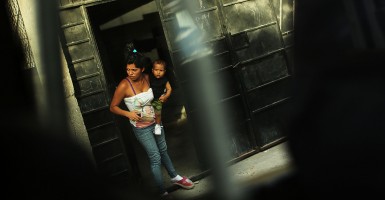In their new book, “The Locust Effect,” authors Victor Boutros and Gary A. Haugen contend the best efforts to help the global poor are thwarted by a “plague of everyday violence” that destroys lives like a “horde of locusts.”
According to the authors, the end of poverty requires the end of violence. Violence destroys gains made to improve the lives of the poor, and holds them there—a phenomenon they have dubbed The Locust Effect.
This week, Boutros spoke to a Heritage Foundation audience about the book.
“This is the hidden plague of our era that is quietly devastating the hope of the poor—the everyday reality of common, lawless violence,” said Boutros.
Boutros cites gender violence, forced labor, police abuse and theft of land as the main forces holding the poor in poverty.
“The poor don’t run to the police, they run from the police,” says @BoutrosVictor.
Boutros argues that educating women and girls is a proven way to reduce poverty, but violence “in the home, in the school, and on the way to school” prevents their education, and thus future prosperity.
The poor in developing countries are “held in poverty by force through slavery,” and in many parts of the developing world, “in a moment of crisis, the poor don’t run to the police, they run from the police.
“Violence has the power to devour many of the ways in which we assist the poor: The new schoolhouse is of no use to the girl who can’t walk to school without being raped. The new high-yield seeds are of no use to a farmer who’s been thrown off [his] land.”
Boutros points out that all of these violent acts are against the law in developing countries and that legitimate law enforcement would be a big step towards reducing poverty.
He argues that “violence causes poverty, rather than the other way around:
“In every conversation about global poverty, someone should be asking, ‘What about the violence? How is that impacting this problem?’ We have to start talking about poverty differently, and doing something differently as well.”
According to the authors, an estimated 4 billion people worldwide “live outside the protection of the law.”






























